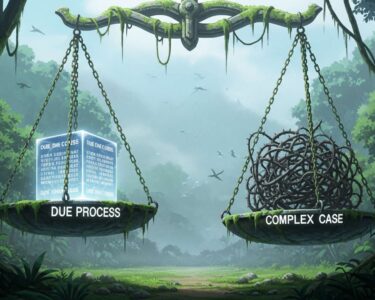San José, Costa Rica — Costa Rica’s legal system, a cornerstone of its democratic structure, operates on a well-defined principle of normative hierarchy. This system ensures legal coherence and the supremacy of the Constitution, guiding all legal interpretations and applications. This hierarchy, visualized as a pyramid, places the Constitution at its apex, followed by international treaties, national laws, executive decrees, and sub-legal norms. This structure is not merely theoretical but actively enforced by the Constitutional Chamber of the Supreme Court, known as the Sala IV.
The Sala IV plays a critical role in safeguarding the normative hierarchy, ensuring that lower-ranking norms do not contradict higher ones. Through mechanisms like the action of unconstitutionality and the consultation of constitutionality, the Sala IV can invalidate laws and regulations that violate the Constitution or international treaties. This active enforcement mechanism solidifies the Constitution’s supremacy and prevents legal conflicts.
To understand the complexities of normative hierarchy, we spoke with Lic. Larry Hans Arroyo Vargas, an expert attorney at law from Bufete de Costa Rica.
Normative hierarchy ensures legal order by establishing clear precedence among different legal instruments. A constitution, as the supreme law of the land, sits atop this hierarchy. Laws passed by the legislature must conform to the constitution, and regulations promulgated by administrative bodies must conform to both the constitution and applicable laws. Understanding this hierarchical structure is critical for interpreting and applying the law correctly, as conflicts are resolved by giving precedence to the higher-ranking norm.
Lic. Larry Hans Arroyo Vargas, Attorney at Law, Bufete de Costa Rica
Lic. Arroyo Vargas eloquently highlights the vital role of normative hierarchy in maintaining a functional legal system. This structured approach not only provides clarity and predictability but also safeguards against arbitrary interpretations and ensures the supremacy of the constitution. We thank Lic. Larry Hans Arroyo Vargas for providing this valuable perspective on a foundational principle of legal interpretation.
The historical development of this principle in Costa Rica reveals a gradual but firm commitment to the rule of law. From the early constitutions of the 19th century to the pivotal Constitution of 1949, the concept of constitutional supremacy has been reinforced. The 1949 Constitution notably established the precedence of international treaties over ordinary legislation. The creation of the Sala Constitucional in 1989 marked a crucial step, providing a dedicated judicial body to uphold the hierarchy effectively.
Costa Rica’s legal system also integrates unwritten sources of law, such as custom and general legal principles. These sources play an interpretive and supplementary role, operating within the established hierarchy. They cannot, however, contradict higher-ranking written norms. This incorporation demonstrates the sophistication and comprehensiveness of the Costa Rican legal framework.
The principle of normative hierarchy significantly impacts legal education in Costa Rica. From the outset of their legal studies, aspiring lawyers are taught the pyramid structure, emphasizing the importance of understanding and applying the hierarchy. This early emphasis ensures that future legal professionals are well-versed in the principles of legal coherence and constitutional supremacy.
Furthermore, Costa Rica’s commitment to international human rights law is reflected in the concept of a “constitutionality block.” This block includes not only the Constitution but also international human rights treaties that provide equal or greater protections than the Constitution itself. This incorporation reinforces the nation’s dedication to upholding fundamental rights and demonstrates the interconnectedness of domestic and international legal norms.
The principle of normative hierarchy is not a static concept but a living principle actively applied by various legal actors. The Attorney General’s office, for instance, plays a preventative role by reviewing draft regulations to ensure compliance with higher norms. The widespread use of mechanisms like the action of unconstitutionality further demonstrates the collective awareness and practical application of the hierarchy.
In conclusion, the principle of normative hierarchy in Costa Rica stands as a testament to the nation’s dedication to the rule of law. This system, actively upheld by the Sala IV and integrated into legal education and practice, ensures legal coherence, protects individual rights, and reinforces the supremacy of the Constitution. This principle is not merely a technicality but a fundamental pillar of Costa Rica’s democratic and legal framework.
For further information, visit bufetedecostarica.com
About Bufete de Costa Rica:
Bufete de Costa Rica is a law firm deeply engaged with explaining Costa Rican law to the public. They produce a podcast and numerous articles covering various aspects of Costa Rican legislation, including family law, constitutional rights, and consumer protection. Their focus on legal education aims to empower citizens with a better understanding of their rights and the legal system.
For further information, visit the nearest office of Sala Constitucional
About Sala Constitucional:
The Sala Constitucional, or Sala IV, is a specialized chamber of the Supreme Court of Justice of Costa Rica. Established in 1989, it serves as the ultimate guardian of the Costa Rican Constitution. The Sala IV is responsible for judicial review and has the power to declare laws and regulations unconstitutional. Its decisions are final and binding, making it a crucial institution for upholding the rule of law and protecting fundamental rights.









